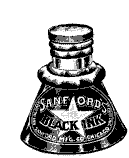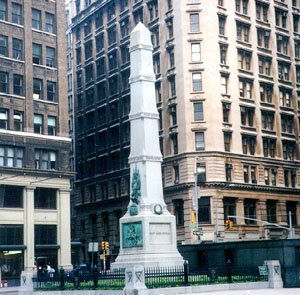
Tarrant County TXGenWebResting In Peace, AgainDonors restore neglected tomb of war hero who inspired Fort Worth's name.Article
written by Bill Marvel, Nov. 27, 1993 Dallas Morning
News |
![]()
|
Major General William Jenkins Worth can finally rest in peace.. After an eight-year, $150,000 campaign, the hero of the War of 1812, the Seminole Indian expedition and the Mexican War, the man who put the Worth in Fort Worth, now lies in a refurbished and restored tomb. For almost 140 years, General Worth has slumbered beneath a 51-foot bronze encrusted obelisk at the intersection of two of the most famous streets in the world, New York City's Broadway and Fifth Avenue. But over the years his rest has been increasingly disturbed as transients and vandals have torn down sections of the cast iron ornamental fence, uprooted the plants around the monument and defaced its granite base with graffiti. Time and traffic fumes have also taken their toll and by 1987, the monument was becoming such an eyesore that New York City's Parks and Recreation Department put it up for adoption. The year before, the Department had established an Adopt-A-Monument program to encourage public spired citizens to underwrite the renovation and upkeep of statues and monuments. General Worth's obelisk and tomb was one of the first 20 monuments in the program, which has since become a model for similar campaigns in Dallas and other cities. But while donors adopted almost 30 other pieces of public art, the Worth Monument languished uncared for and all but unloved. But last year, two major donors stepped forward. Disappointingly, neither was from Fort Worth. The Society had hoped some civic-minded Fort Worth resident would adopt the general's tomb, but aside from $1,000 from the Bass family and $1,000 from the late Bill Turner [neither recent] contributions from west of the Trinity have been nonexistent. Admittedly, the Fort Worth connection is tenuous. In fact General Worth never set foot there. He was dying of cholera in San Antonio when the military outpost on the Trinity was established and named in his honor. But the general had no particular connection with New York's 23rd Street either, yet a group of merchants there have contributed money toward the monument's upkeep. The largest donation was from the Paul and Klara Porzelt Foundation which was established by a German-born businessman with an interest in Beaux Arts sculpture and architecture. Since 1989, this Foundation has contributed $85,000 to the Worth Memorial. The second largest contribution is from a retired naval commander, the great-great-grandson of General Worth, who donated $63,000 and included an endowment to take care of the monument. The 87-year-old officer, who lives in Florida, says he first saw the Memorial in the 1920s when [odd man out in a family of West Point graduates] he was a midshipman at the U. S. Naval Academy. Commander Woodruff says he had heard tales of the General from his Grandmother Sprague who was married to an aide of General Worth's. Commander Woodruff says he first started donating small amounts of money when he heard of its condition. "But we never could get enough to do the job, so I went all out to pay what was necessary to finish the job. I'd had reports from friends who visited it who said, ‘My God, the thing's coming apart.' The fence was broken up. It's a marvelous fence." The cast-iron fence is a virtual dictionary of 19th century military ornamentation. The pickets are replicas of the ceremonial sword presented to General Worth by The State of New York. Binding the swords together are bands of oak leaves, symbolizing victory, plus swags and tassels. The fluted posts rest upon replicas of Civil War-era mortars. Though it's hard to tell from old photos what plants originally graced the monument, floral bulbs and English ivy are being planted. In addition, the granite and bronze have been refurbished and the area around the monument is being cleaned up. Where original stone was missing, granite was obtained from the original quarry and shaped to fit. When all work has been finished, the monument will once again be an adornment rather than an embarrassment to the neighborhood. A ceremonial dedication is scheduled for November, 1995. In honor of General Worth, Major General Robert J. St. Onge, commandant of the corps of cadets of the U. S. Military Academy at West Point and the Academy Color Guard will participate. Commander Woodruff says he won't be able to attend. But the family will be represented. General Worth will be there. |
![]()
|
This page was last modified 21 June 2019. Copyright © 2001-2019, Tarrant County TXGenWeb. All rights reserved. |
